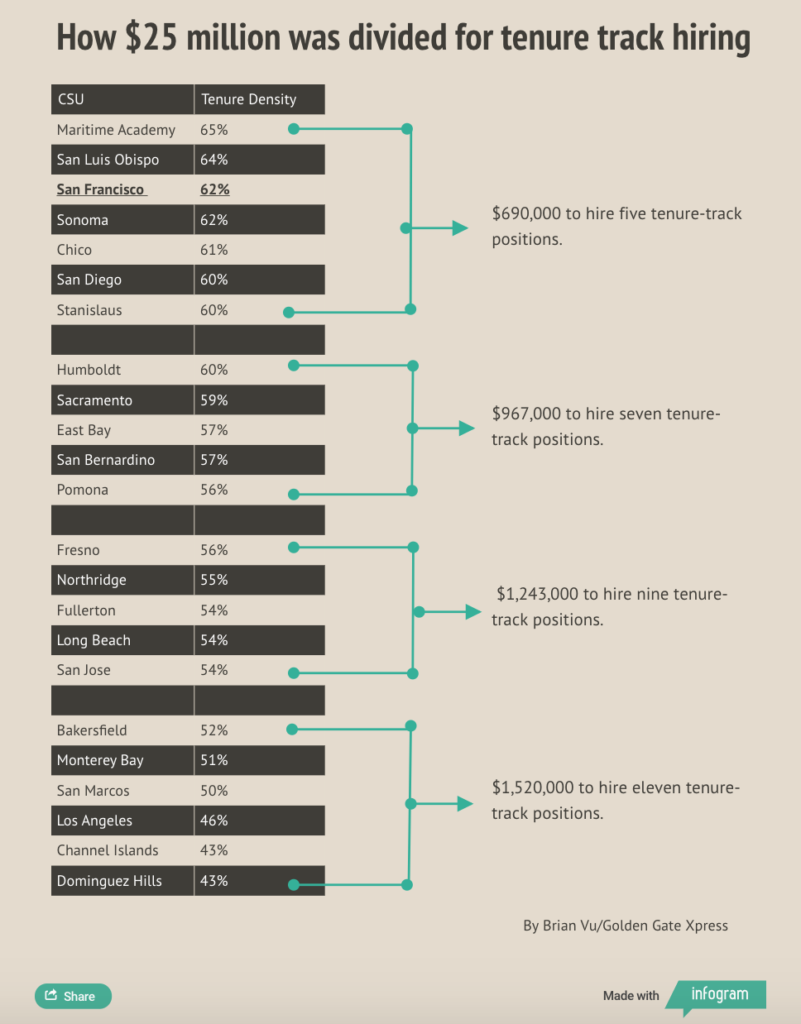SF State administrators opted to divert money the state legislature earmarked last year for increasing tenure-track faculty density to instead bump up course offerings, despite concerns raised by the California Faculty Association that the University is breaking the law.
Legislators designated $25 million to bolster tenure-track faculty density out of $75 million allocated to CSU for Graduation Initiative 2025 in the 2018-19 state budget.
But SF State Provost Jennifer Summit said the University is within its rights to redirect the money toward other goals and hiring procedures make it impossible for SF State to use its portion of the pie for new hires.
Tenure-track faculty contribute to the academic community in ways lecturers don’t. Their jobs include curriculum development, advising, research in their fields, involvement in committees and shared governance of the University. But through attrition, tenure-track faculty density has fallen to varying degrees throughout the CSU system.
“We have a lot of retirements and people who are on a tenure-track that leave before they’re tenured, so there’s been an erosion of tenure density,” CFA Field Representative Maureen Loughran said. “This money was specifically to try and buck that trend, turn the ship around, have more tenured and tenure-track faculty.”
The Chancellor’s Office distributed the $25 million among the 23 CSU’s at the beginning of October last year based on current tenure-track faculty density at each institution.
SF State has a density of 62 percent according to the Chancellor’s Office, and was apportioned $690,000 to hire five new tenure-track faculty members in addition to its typical yearly hires. Schools with lower densities like Cal State LA, CSU Dominguez Hills and CSU Channel Islands, which are all well under 50 percent, received $1,520,000 to fill an additional 11 tenure-track positions each.
Summit said SF State has put off hiring until next year because the funds are ongoing. Instead she’s put a priority on enhancing class offerings with the 2018-19 funds in an effort to increase graduation rates.
“We got the money in the middle of this year, so what we’re doing in the meantime is directing it towards more classes this year during the summer than we’ve done before, and we’re also directing it to high-demand classes in the next academic calendar,” Summit said. “That’s while we’re in the process of hiring our new tenure-track faculty.”
Neither Xpress nor CFA representatives were able to get details from the provost on which additional classes the money would pay for and at what cost, but CFA Chapter President James Martel said the union has considered hiring an accountant to perform an audit on the University’s spending to determine where exactly the funds are going.
“New faculty that were hired for this fall didn’t get their first paycheck and were not even covered by benefits until Oct. 1, so it was not the middle of the school year, it was the very beginning of the school year,” Loughran said. “Every other campus in the CSU got the money at the same time and figured out a way to hire more tenure-track faculty with the money they got—except for San Francisco State.”
Legality questioned
Martel said creating additional class sections is an admirable goal, and one that is highly beneficial to students, but he’s concerned with the legality of the University’s methods.
“What worries me [about the increased class sections] is that they’re doing it with funny money,” Martel said. “It’s money that doesn’t belong to them, so even if they used it to cure cancer it would still be a problem.”
The allocation of state funds comes with the caveat that CSU is required to report back to the legislature in Nov. 2020 and every two years thereafter to prove that they’ve spent the money as the legislature intended.
Summit, however, is confident that as long as SF State can show that it made the five hires by the reporting deadline, the University is within the letter of the law. She also told Martel in an email obtained by Xpress that the decision to divert the funds was made with the Chancellor’s Office’s blessing.
Director of Public Affairs for the Chancellor’s Office Toni Molle told Xpress in an email that someone from the Chancellor’s Office may have had a separate conversation with SF State’s Provost Office approving the diversion of tenure-track hiring funds, but she couldn’t confirm what if any specific guidance might have been given to the University.
“The CSU does expect to expend the funding as prescribed in the 2018-19 budget bill to increase the number of tenure-track faculty across the system,” Molle said. “Utilizing the funding [to increase class availability] falls within the general guidelines as outlined in the budget allocation memo distributed to the campuses [by the Chancellor’s Office]. Each campus has the discretion to use funds in support of its specific Graduation Initiative goals.”
Xpress obtained a copy of the Oct. 3 memo, which delineates the allocation of the $75 million from the state budget to CSU’s Graduation Initiative 2025. It said the Chancellor would distribute the money among the system’s 23 universities three different ways, two of which would be directed toward goals like increasing graduation and retention rates. The third category, which is the $25 million in question, was specifically designated for increasing tenure-track faculty density.
“The Office of the Chancellor expects that the $25 million investment will result in at least 180 new tenure-track faculty hires systemwide,” the Chancellor’s memo read.
The budget’s language is just as explicit and Loughran was emphatic in her assertion that funneling any portion of the $25 million toward projects that don’t increase tenure-track faculty density is illegal.
“The legislative budget intent could not be more clear, this money shall be used for this purpose and this purpose only,” Loughran said. “If they’re using it for anything else then they’re breaking the law. Plain and simple.”
Differing interpretations
Provost Summit said because the University has until November 2020 to prove they hired the five tenure-track professors, in the meantime, as Molle asserted, they can distribute the funds at their discretion.
Part of the reporting requirement is that they must offer the legislature evidence that they used the money to increase tenure-track density. The budget language provides a list of documentation they can present to illustrate this, including providing the number of new tenure-track faculty, the amount of money spent on hiring new tenure-track faculty and the number of lecturers promoted to tenure-track. Also on this list is the number of classes added.
Reporting the number of classes added refers to evidence the university can provide the legislature to show it added more tenure-track faculty—i.e. more professors would create more availability of classes—but Summit said she interpreted this language as an indication that the University is permitted to spend tenure-track hiring funds on increasing class offerings unrelated to hiring.
Someone close to the state legislature who spoke on condition of anonymity told Xpress unequivocally that California lawmakers’ intent for the funds was very narrow and the money was strictly designated for hiring tenure-track faculty. He said legislators would not be happy if these funds were diverted for other purposes, including increasing class offerings.
Legislative aide Eva Maina, who works for State Assemblymember Kevin McCarty, the chair of the Budget Subcommittee on Education Finance, said the legislature will hold an April 2 budget hearing on this issue.
“Some of the concerns about the funds being diverted will be covered during the hearing,” Maina said. “We are also looking into the concerns regarding the CSU and their use of funds.”
CFA Legislative Director Mario Guerrero, who worked with the legislature’s budget committee to get the tenure-track hiring funds, also noted that the state budget’s language is clear and it contradicts Summit’s interpretation.
“The $25 million is new, ongoing dollars that was specifically allocated for this purpose,” Guerrero said. “Whatever money they don’t spend [on hiring] this year they [need to] just roll it over and spend it next year on staff.”
The provost provided another reason for delayed hiring. She said the University can only hire at certain times of the year and the president and deans only look at proposals for new tenure-track faculty in late spring and early summer.
“Academic searches always take place on a calendar cycle,” Summit said. “The departments put in requests for new faculty right around spring semester [and] those are approved by me and the president after consulting with our data team and each of the deans. Then the process for searching for new faculty takes about a year.”
Guerrero said even if there were scheduling issues based on when the funds were initially allocated, it wouldn’t mean that the University could just spend the dedicated funds on something else. He said the funds would have to roll over to the following year in that case.
“Say they got money to hire 15 tenure-track faculty and they were able to hire 10,” Guerrero said. “Then if anyone asks them they should say, ‘You know, we have money to hire 15, but because of hiring schedules and other policies or issues we were only able to hire 10 this year, so next year we will hire the remaining five.”
‘Pressing need’
Other universities seemed impervious to the hiring calendar cycle Summit described, though, and wasted no time beginning their searches.
“Sonoma State in July was doing eight tenure-track hires for this year, which is low, and then in October they got the additional money from the Chancellor’s Office and they said, ‘Now we’re doing 16 new tenure-track hires,’” CFA Field Representative Maureen Loughran said. “They doubled the number of tenure-track searches in October and they’re still putting the advertisements out.”
On the popular academia job search sites CSU Careers and the Chronicle of Higher Education, CSU Dominguez Hills placed 30 ads for tenure-track faculty since Oct. 1, Sacramento State placed 74 and San Jose State placed 38. Meanwhile, SF State placed just nine ads for tenure-track faculty in that period.
And though Summit said she and the University president need to wait for requests from deans and department chairs to find out which disciplines need new tenure-track faculty, CFA Chapter President James Martel, who previously served as the political science department chair for nine years, said departments across the University are always vying for new faculty.
“There’s always way more [denied] tenure-track search requests than are granted, so there’s a massive backlog,” Martel said. “I think it would be pretty easy to just go to departments that were turned down and go, ‘Actually you can have your search after all,’ and people would be delighted.”
“There’s such a pressing need for tenure-track faculty in so many departments that it’s just a crisis,” he added. “Putting it off a year is really unfortunate when there’s this pent-up demand.”
But Martel’s biggest concern is what this potential misuse of funds could mean for SF State’s relationship with the legislature.
“I’m really worried that the way they’re doing this at San Francisco State will be read as noncompliant by the state legislature since the money was not earmarked for anything but tenure-track hires,” he said. “Using it for other purposes makes me concerned that in the future when the state legislature is asked for more money, they’re just not gonna give it to us.”
This story previously erroneously referred to Cal State Los Angles as UCLA when referring to schools with tenure-track densities below 50 percent. Xpress regrets this error.











